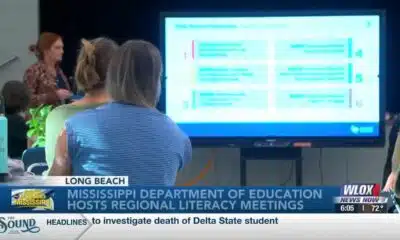News from the South - Texas News Feed
More children, teens in Houston developing liver disease
SUMMARY: Fatty liver disease, once seen as an adult condition, is increasingly affecting children and teens, with 25% of liver disease linked to diet. Currently, one in ten children and one in four adults are affected. At-risk children often have a high body mass index, central obesity, insulin resistance, or a family history of the disease. While many exhibit no symptoms, some may experience abdominal pain. Simple preventive measures include eliminating sugary drinks and promoting overnight fasting. If untreated, fatty liver disease can lead to severe complications, including liver failure, emphasizing the importance of early intervention and lifestyle changes.
In the past, fatty liver disease was considered an adult sickness, but doctors are seeing an alarming trend of young children and teenagers being diagnosed with it.
News from the South - Texas News Feed
Frustrated with poor play against UTEP, Arch Manning will 'get back to basics'
SUMMARY: Texas quarterback Arch Manning and coach Steve Sarkisian acknowledge the team’s underwhelming offensive performance in a 27-10 win over UTEP. Manning completed 11 of 25 passes for 114 yards with a touchdown and an interception, frustrating fans expecting a stronger showing at home. Despite a rough first half with 10 consecutive incompletions, Manning showed flashes of promise and scored twice on the ground. Sarkisian emphasized Manning’s mental struggle rather than physical injury and expressed confidence in his growth and consistency. Manning committed to improving fundamentals and handling in-game pressure ahead of tougher matchups, including their SEC opener against Florida on Oct. 4.
The post Frustrated with poor play against UTEP, Arch Manning will 'get back to basics' appeared first on www.kxan.com
News from the South - Texas News Feed
Texas nursing students return from life-changing internship in Africa
SUMMARY: Two Texas nursing students, Tom Strandwitz and Valerie Moon, participated in Mercy Ships’ inaugural nursing internship aboard the Africa Mercy hospital ship in Madagascar. Selected from nationwide applicants, they gained hands-on experience in various departments, providing free surgeries and care in underserved regions. Their travel expenses were covered by over $11,000 raised through community GoFundMe campaigns. Both students were deeply impacted by patient interactions, such as cataract surgeries restoring sight and building trust with families. The internship broadened their perspectives on global health care. They plan to continue careers in intensive care and public health, with hopes to return to international nursing missions.
Read the full article
The post Texas nursing students return from life-changing internship in Africa appeared first on www.kxan.com
News from the South - Texas News Feed
Austin becoming FEMA-approved emergency alert authority, planning 1st test alert
SUMMARY: On Monday, Sept. 29, Austin will conduct a test of the Integrated Public Alert and Warning System (IPAWS), becoming a FEMA-approved alerting authority able to send emergency alerts via Wireless Emergency Alerts (WEA) to cell phones and Emergency Alert System (EAS) messages to TV and radio. This coordinated test at 3 p.m. will cover the city across its three counties—Travis, Hays, and Williamson. The alerts will clearly indicate a test and require no action. IPAWS allows authenticated, geotargeted emergency notifications without subscription, enhancing public safety communication. More details are available at ReadyCentralTexas.org and Ready.gov/alerts.
The post Austin becoming FEMA-approved emergency alert authority, planning 1st test alert appeared first on www.kxan.com
-
News from the South - North Carolina News Feed6 days ago
What we know about Charlie Kirk shooting suspect, how he was caught
-
Local News7 days ago
Russian drone incursion in Poland prompts NATO leaders to take stock of bigger threats
-
News from the South - North Carolina News Feed6 days ago
Federal hate crime charge sought in Charlotte stabbing | North Carolina
-
The Center Square7 days ago
Weapon recovered as manhunt continues in Kirk assassination investigation | National
-
Our Mississippi Home5 days ago
Screech Owls – Small but Cute
-
News from the South - Arkansas News Feed6 days ago
NW Arkansas Championship expected to bring money to Rogers
-
News from the South - Alabama News Feed7 days ago
Huntsville Fire & Rescue Holds 9/11 Memorial Service | Sept. 11, 2025 | News 19 at 5 p.m.
-
News from the South - North Carolina News Feed6 days ago
Under pressure, some immigrants are leaving American dreams behind











































